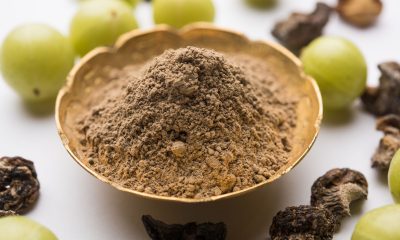Health
Benefits of apple cider vinegar gummies

Discover the benefits of apple cider vinegar gummies.
We all remember when we were kids and we had a jar of vitamin gummy that tasted like candy. One of the best ways to get younger children to take their vitamins is by camouflaging them as one of their favorite snacks: fruit snacks.
Apple Cider Vinegar (ACV) gummies may not be as palatable to younger children, but they have a lot of appeal for adults.
Recently, ACV gummies have been gaining in popularity—here’s a brief overview of what apple cider vinegar is and why it’s all the rage.
What is apple cider vinegar?
Apple cider vinegar has been a popular home remedy in cooking and medicine for centuries.
There are many mentions about the therapeutic effects of apple cider vinegar, but it is important to note that it has not been shown that it can treat or cure diseases; however, they can be used together for greater health benefits.
Some people claim that stroke can prevent and treat multiple diseases, including cancer, but there is no research to back up these claims.
Making apple cider vinegar is a bit different than making apple cider. Both are made from pressed apples, but in ACV the apples are fermented. Fermentation is the chemical breakdown using bacteria or yeast.
During the fermentation process, the sugar in apples is converted to alcohol and after adding beneficial bacteria to further fermentation, it creates acetic acid.
Acetic acid is one of the main components of vinegar and is responsible for many of the health benefits in vinegar, including apple cider vinegar.
Other types of vinegar are made by fermenting grains, while apple cider vinegar is made by fermenting apples.
ACV can mainly be purchased in two presentations, filtered and unfiltered:
The unfiltered alternative includes the “mother”, which appears cloudy when viewing the bottle. Cloudiness does not mean it has gone bad.
Rather, these are the beneficial gut proteins, enzymes, and bacteria. If you are going to use the unfiltered alternative, be sure to shake the jar first.
The filtered alternative does not have the “mother” and has undergone a filtration process and probably a pasteurization process as well.
Both types of ACV can be used in a variety of ways, such as baking, cooking, beauty products, and even household cleaning. It’s a versatile ingredient and a great kitchen staple to have on hand.
Health benefits of apple cider vinegar gummies
The health benefits are one of the main reasons ACV is so popular. Here are some of the main pathologies on which apple cider vinegar could have an effect.
1. Regulation of blood sugar level
The blood sugar level is the amount of glucose in our blood that the body can use for energy. When levels rise and fall inconsistently, this can lead to chronic disease.
Some studies have shown that taking apple cider vinegar before a high-carbohydrate meal might slow the rate at which food passes from your stomach to your intestines.
A slower rate of emptying prevents sudden ups and downs in blood sugar levels. ACV might also help improve insulin sensitivity by moving more glucose out of the bloodstream.
It has been shown that around four teaspoons a day can produce benefits. Remember to take your medications as prescribed and work with your healthcare professional if you are making any changes.
2. Weight Loss
Some report better weight control when supplementing with ACV. A common report is a feeling of fullness that causes people to eat less.
A 3-month study found that daily consumption of apple cider vinegar led to a reduction in abdominal fat and weight loss.
The best results have been seen when combined with diet and lifestyle changes.
Adding an item to your lifestyle probably won’t have a significant effect on your overall weight loss or weight management. For long-term success in weight management, consult with a registered dietitian.
3. Elimination of bacteria
Vinegar has been used for its antibacterial properties for many years, especially in cleaning agents and cooking methods such as pickling.
Vinegar, including apple cider vinegar, may help kill pathogens like bacteria, though it may not be as effective as commercial-grade cleaners.
It could also be used to preserve food, as it prevents the growth of bacteria in food to prevent it from spoiling quickly.
4. Cholesterol reduction
There have been some studies that indicate that vinegar might reduce the chance of developing heart disease. These conditions are often genetic, but dietary changes have also shown benefits.
An animal study showed that ACV intake reduced cholesterol and triglyceride levels, both of which are associated with heart health.
There are no conclusive human studies regarding these claims, so definitive conclusions cannot be drawn.
Ways to take apple cider vinegar
There are several ways to take ACV: it can be in the form of liquid, capsules, tablets, and gummies. Recently, gummies have become a popular way to take supplements, especially for those who don’t like the taste of a nutrient in other forms.
Gummies are edible, sweet, and chewy, and sometimes come in various shapes and sizes. Taking supplements in gummy form has several advantages:
Gummies are practical. If you’re on the go or in a hurry, it’s easy to take apple cider vinegar gummies with you wherever you go. They are easy to take and you won’t have to drink water or worry about how much liquid you have when you pack.
Gummies are typically preferred because they taste better than other forms of supplements. This makes them an attractive alternative. This also increases the desire to take your vitamins and leads to less forgetfulness.
Having a fun period in the day, like taking a vitamin gummy, could be nostalgic and fun. The best way to remember to do something is to have fun doing it. A flashback to the past can be an invigorating way to take your vitamins.
Something to consider when choosing supplements in the form of gummies is the sugar content. To make them taste sweet like a fruit snack, sugar sometimes needs to be added.
Some vitamin gummies may have 2 to 8 grams of sugar per serving. When the amount of added sugar is higher, this reduces the health benefits, even when combined with health-promoting foods like apple cider vinegar.
If sugar is excluded, the gummies could use artificial sweeteners or sugar alcohols, which could cause digestive problems in some people.
Because they are so delicious, they may be easier to overeat. Keep in mind what the recommended portion is and stick to it. Excess consumption, especially in children, can lead to vitamin or mineral toxicity.
Vegans and vegetarians looking to add apple cider vinegar gummies to their routine, or any other type of gummy, can take a look at the ingredient list. Many gummies are made with cornstarch, water, sugar, food coloring, and gelatin.
Gelatin is made from the bones and ligaments of animals and is not suitable for vegans or vegetarians. Instead, choose a vegan-friendly ACV gummy that uses pectin.
Ways to use apple cider vinegar
Not only can you take ACV orally as a nutritional supplement, but you can also use it at home or in cooking or baking. Here are some ideas for incorporating this must-have product into your routine.
Prepare an all-purpose cleaner by mixing 1 cup of water with a half cup of apple cider vinegar.
Do you have fruit that has been out in the open too long or a new plant in the house? You may need help catching fruit flies. Pour 1/4 cup of apple cider vinegar into a glass and add a few drops of dish detergent and they’ll be gone in no time.
Prepare a solution for fruits and vegetables that allows you to better clean your produce. Using apple cider vinegar to wash your product may help reduce bacteria like Escherichia coli and Salmonella.
Side Effects of Apple Cider Vinegar
In general, ACV is safe to consume, but it could cause side effects in some people. Due to its high degree of acidity, regular intake could damage tooth enamel.
Those who use medications such as insulin or diuretics should also check with their healthcare professional before making any changes, as ACV may have drug interactions with these medications.
If you experience nausea or vomiting after taking ACV, this could be due to heartburn. Stop use immediately and see your doctor.
Conclusions
All in all, apple cider vinegar can be very effective, both for use at home and for possibly promoting health benefits related to blood sugar, weight management, and bacteria.
If you’re thinking of taking ACV, check with your doctor before starting anything new.
Health
Benefits of coconut water in pregnancy

Discover the benefits of coconut water in pregnancy.
Coconut water is a clear, sweet, energizing isotonic drink that helps your body replenish lost fluids. Also known as Nariyal Pani and Elaneer in India, it is known for its versatility and countless nutritional benefits.
IS IT SAFE TO CONSUME COCONUT WATER DURING PREGNANCY?
Yes, it is safe to drink coconut water, but in moderation, as it contains natural vitamins and minerals.
Having coconut water in the first trimester helps curb dehydration resulting from morning sickness. It’s also good for heartburn and constipation, common symptoms of pregnancy.
You can drink coconut water at any time, but the best time is early in the morning. It is healthier, as the electrolytes and nutrients can be easily absorbed when the stomach is empty.
The nutritional benefits present in a cup of coconut water include:
•Calories 46
•Sodium 252mg
•600mg potassium
•Carbs 8.9 grams
•Dietary fiber 2.6 grams
•Sugars 6.26 grams
•Calcium 6%
Benefits of coconut water in pregnancy
You can reap its benefits only when you consume fresh water, as it begins to ferment when left open and exposed to air.
1. NATURAL DIURETIC:
During pregnancy, uric acid levels should be normal in your body system. Coconut water is a diuretic and increases the need to urinate due to the presence of potassium, magnesium, and minerals.
They help eliminate toxins and cleanse the urinary tract. Thus, it improves kidney function and prevents kidney stones and infections. It also prevents urinary tract infections, which reduces the chances of preterm labor.
2. OFFERS ESSENTIAL ELECTROLYTES:
The need for electrolytes increases during pregnancy because conditions like morning sickness, nausea, and diarrhea dehydrate the body. Coconut water supplies all five essential electrolytes: minerals, sodium, calcium, potassium, and phosphorus, which calm the body and provide energy.
These electrolytes transmit electrical charges in your body and aid in muscle function. They also help maintain your body’s pH levels and control blood pressure levels. It is known to have cooling properties, which prevent conditions such as bilious fever and vomiting.
3. RELIEVES HEARTBURN AND CONSTIPATION:
Hormonal changes during pregnancy lead to various problems like heartburn, constipation, and indigestion. The rich content of dietary fiber in coconut water strengthens the digestive system, improves digestion, regulates pH levels, and prevents constipation.
Ayurveda considers young coconut water to be an excellent laxative. Improves metabolism and detoxifies the body. Coconut water is a natural acid neutralizer and thus prevents heartburn.
4. TREAT INFECTIONS:
Coconut water is rich in vitamins, essential minerals, and antioxidants, which boost your immune levels, providing resistance to infections. It contains lauric acid, a medium-chain fatty acid responsible for the production of a powerful antiviral monolaurin, Michelle-Lee Young writes in the book “Two Trees and Twelve Fruits That Will Change Your Life Forever.” Lauric is a disease-fighting acid that kills harmful bacteria and infections like the flu, and HIV, and retains good bacteria.
5. IMPROVES HEART HEALTH:
Low electrolyte level increases blood pressure. Drinking coconut water improves levels of potassium, magnesium, and lauric acid, which help regulate blood pressure. Improves good cholesterol and fights bad cholesterol.
The vitamins, essential proteins, and electrolytes in coconut water control sugar levels, and blood pressure levels, and improve circulation. A glass of coconut water every day is particularly helpful in the last trimester when there is increasing stress from labor that can increase your blood pressure.
6. MAINTAINS A HEALTHY WEIGHT:
Coconut water is fat-free and low in calories. As pregnancy adds extra weight to your body, coconut water prevents fat accumulation by removing bad cholesterol. It is an excellent replacement for sugary drinks and helps both the mother and the growing fetus to be healthy and fit.
7. NATURAL DRINK:
Coconut water is a tasty natural drink. It has no artificial flavors or harmful components. It is safe for you and your growing fetus as none of its components affect your health.
8. ENERGIZE AFTER TRAINING:
Coconut water is a natural isotonic drink, which helps you gain energy when suffering from dehydration, fatigue, and exhaustion. It is a great revitalizer
. If you exercise regularly to stay fit and strengthen your pelvic muscles, you can opt for coconut water as an energy drink. Hydration also improves skin elasticity, limiting the stretch marks that develop during pregnancy.
9. LOW SUGAR CONTENT:
Excessive sugar intake can lead to an increase in overall blood sugar levels. Coconut water has less sugar than other sports and energy drinks. You won’t gain pregnancy weight, and a diet low in simple sugars will reduce your risk of getting gestational diabetes.
10. ACCELERATES THE GROWTH OF THE FETUS:
Coconut water offers all the nutrients to the mother, essential to maintain and improve her health. Thus, it improves the health, growth, and proper nutrition of the unborn baby.
11. IMPROVES AMNIOTIC FLUID LEVELS:
Drinking coconut water improves the overall health and environment of your growing fetus. Coconut water taken especially in the third trimester increases amniotic fluid levels and improves blood volume and circulation.
ARE THERE ANY SIDE EFFECTS OF COCONUT WATER DURING PREGNANCY?
There is no evidence that coconut water has adverse effects on pregnancy. Like any other fruit or vegetable juice, it also appears to be safe. But there are two things to keep in mind:
•Coconut milk contains sodium, which may not be the right choice for pregnant women with preeclampsia.
•Ripe coconut water can cause constipation.
HOW MUCH COCONUT WATER CAN A PREGNANT WOMAN HAVE?
Moderation is always the key when it comes to eating a healthy diet. You can drink up to a glass of coconut water a day.
Consume the water soon after opening, as a fresh one will contain rich nutrients. Use a clean straw or pour it into a glass and drink.
It is always good to prefer natural coconut water to canned or bottled.
Do not consume coconut water if you react or do not like its taste.
HOW TO SELECT THE CORRECT COCONUT?
To enjoy the various benefits of coconut water, you need to know how to select them properly. These tips can help you buy fresh and tender coconut.
A fresh coconut will be light and sweet and will not contain coconut meat, the white, meaty, tender substance. A ripe or stale one will taste sour.
Selection: Choose medium-sized, clean, green walnuts, as they contain large amounts of water. Don’t choose coconuts that have hard brown shells and gray patches as they indicate ripe nuts.
Water: Shake the coconut vigorously near your ear to check for water. Select the ones that make a good splashing sound. A fresh coconut will contain almost a cup of water.
If you want to store coconuts at home, keep them in a cool place.
BENEFITS OF COCONUT MEAT DURING PREGNANCY:
1. GENERATION OF BREAST MILK:
Regular consumption of coconut meat during pregnancy improves the supply of breast milk after childbirth. Your baby will receive nutritious and rich breast milk. Also, coconut oil helps in the generation of breast milk.
It is also good during the lactation phase as it contains lauric and capric acids. These acids have antiviral, antibacterial, and parasiticidal effects, which protect the baby from diseases.
2. IMPROVES BLOOD CIRCULATION:
Blood volume doubles during pregnancy, causing swelling of the feet and legs. Poor blood circulation aggravates the condition. Coconut consumption improves blood circulation and prevents swelling and pain in the legs.
3. HELPS DIGESTION:
Consuming coconut meat and water prevents constipation as tender coconut meat acts as an excellent laxative. It is one of the best benefits of consuming a coconut in any form during pregnancy.
4. BETTER SLEEP:
Having coconut in combination with poppy seeds and ghee will improve your sleep cycle.
5. INCREASES METABOLISM:
When the coconut is mixed with spices, it helps boost metabolic activities in pregnant women.
COCONUT MILK DURING PREGNANCY:
Coconut milk is a thick, milky liquid obtained by grinding grated coconut meat. It is also an essential ingredient in many foods, especially Southeast Asian dishes.
Coconut can be consumed in any form due to its amazing health benefits. Coconut milk helps increase body fuel. It is completely safe to drink unless you are allergic to it.
BENEFITS OF COCONUT MILK DURING PREGNANCY:
1. ENHANCE IMMUNITY:
Coconut milk contains lauric acid, which is an antibacterial and antiviral fat, useful for pregnant women. This type of fat helps improve the immune system, according to the book “Coconut Oil and the Immune System” by Sherri Neal. The long-chain fatty acids straighten the blood vessels and reduce any blockages in the heart, thus improving the condition of the heart as well.
2. OTHER BENEFITS INCLUDE:
•It contains good amounts of iron, which can treat anemia.
•Improves digestive problems.
•It offers relaxation to the muscles and the nervous system.
•Controls blood sugar levels and blood pressure
•Relieves joint pain and scratches
•Makes your body fit and helps you lose weight
HOW TO PREPARE FRESH COCONUT MILK?
It is advisable to make coconut milk at home instead of opting for a packaged one.
Grate a whole coconut and add a cup and a half of hot water.
Let the mixture cool to room temperature.
Once the mixture cools down, strain to get the milk.
Coconut milk taken directly from fresh coconuts will contain approximately 450 calories and 50 g of fat. A cup of coconut milk (approximately 240 g) has the following nutritional values:
•Calories 550
•Fats 50.2gm (all types of fats)
•Cholesterol 0
•Sodium 40gm
•Carbohydrates 14gm (in 250gm of milk)
•Proteins 6gm
•Vitamin C 11%
•Iron 22%
•Calcium 4%
IS CANNED COCONUT MILK GOOD DURING PREGNANCY?
It’s safe to have canned coconut milk during pregnancy, but you need to make sure the can isn’t corroded, rusted, expired, or stored at dangerous temperatures.
Coconut milk contains considerable amounts of saturated fat, that is, 3 g in a tablespoon. Eating too much-saturated fat will increase the levels of good and bad cholesterol in the body. In the case of canned milk, you must take into account your level of consumption, since you should not exceed your daily requirement.
In addition to the above, other reasons why you may not choose canned coconut milk are:
1. BISPHENOL A (BPA):
It is a chemical that is typically used in the lining of cans used for packaged foods. This BPA can gradually leach into acidic, fatty, or salty foods like coconut milk, vegetables, tomatoes, and soups. One study claims that there is a relationship between high levels of BPA in mothers and neurobehavioral problems in babies.
2. GUAR GUM:
Guar gum is an additive present in canned coconut milk. It is a galactomannan, a polysaccharide, and is primarily a ground endosperm of guar beans.
There have been complaints such as severe abdominal cramps, indigestion, flatulence, and diarrhea, as beans are difficult to digest. In a clinical experiment, patients with intestinal problems showed improvement when they stopped using canned coconut milk in their diet.
3. FRUCTOSE MALABSORPTION:
It is a digestive disease characterized by impaired transport of fructose (a simple sugar found in fruits, vegetables, and honey) through the small intestine. Increased fructose levels in the gut cause bacterial overgrowth.
Therefore, it reduces the absorption of water in the intestine. Pregnant women with inflammatory bowel disease (IBD) and irritable bowel syndrome (IBS) are highly affected by fructose malabsorption.
According to nutrition data, coconut milk contains sugar, including fructose. Therefore, it should be avoided by those affected by IBD and IBS disorders.
Health
Disadvantages of miscegenation reproduction

Table of Contents
Health
How to use flax seeds for diabetes

Table of Contents
-

 Food1 year ago
Food1 year ago10 + Benefits of carrot juice and side effects
-

 Health12 months ago
Health12 months ago50 Super Healthy (And Very Often Cheap) Foods
-

 Health1 year ago
Health1 year ago5 Shocking health benefits of kinkeliba and side effects
-

 Food1 year ago
Food1 year ago8 shocking benefits of leek juice and side effects
-

 Health1 year ago
Health1 year agoBenefits of guava leaves Sensually
-

 Weight Loss1 year ago
Weight Loss1 year agoChaz Bono weight loss secret
-

 Health1 year ago
Health1 year ago13 shocking health benefits of Thai eggplant
-

 Food12 months ago
Food12 months ago19 Benefits of tobacco plant and side effects












